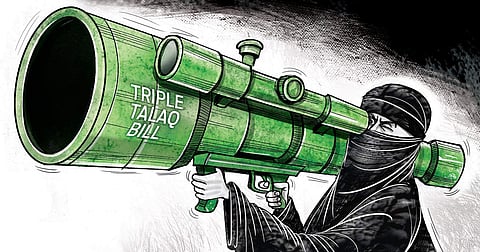

The bill to criminalise instant and arbitrary triple talaq titled, The Muslim Women (Protection of Rights on Marriage) Bill, 2017 was introduced in the Lok Sabha on Thursday and passed without much discussion on the same day—an unusual development indeed. The government had moved in great haste to formulate this Bill and in getting it ready for presenting it in Parliament.
The haste in which the government is pushing it, makes the intention of the government suspect. The justification—it is being done to protect “our Muslim sisters” from the tyranny of their archaic and unjust personal laws.
The Bill was not listed to be introduced that day, nor was it scheduled for discussion. A string of amendments to the Bill, which were suggested by MPs from RJD, AIMIM, BJD, AIADMK and the All India Muslim League on the ground that it will place the entire Muslim community at risk of criminal prosecution, were rejected and the Bill was passed. Though initially the Congress opposed it, the party finally gave in.
There are deeper political questions involved here. It is not a simple matter of protecting Muslim women’s rights. For the BJP, a party which is seen as anti-Muslim, this move will help it gain acceptance among Muslim women as their saviour. The Congress has traditionally been seen as a supporter of conservative Muslim religious leadership; for its new image, to gain confidence of the Hindus, it needs to be seen as taking a distance from issues concerning the Muslim community. The Bill is caught between these political considerations which makes it difficult to examine the gender concerns beneath it.
Though ostensibly the aim of the Bill is to protect the rights of Muslim women, its impact upon the lives of the very same women it intends to protect will be devastating. The impact of incarcerating their husbands for the mere utterance of the words “talaq” three times is counterproductive as the Constitutional Bench ruling of 22 August 2017 has already invalidated arbitrary and instant triple talaq. The effect of this ruling is that the marriage remains intact, despite the utterance of these words.
All Muslim women who have been deserted by their husbands, subjected to physical or mental violence, deprived of their maintenance, including those whose husbands’ have pronounced instant and arbitrary triple talaq, are entitled to relief under the Protection of Women from Domestic Violence Act, (PWDVA) 2005. This Act secures the rights of all women to maintenance, residence, protection from violence and to custody of their children.
Muslim women whose husbands have pronounced instant and arbitrary triple talaq upon them are not an exception. Sending the husbands to jail for uttering words which no longer have any legal validity will amount to excessive use of criminal law for violation of civil rights and also place the woman at a greater risk of being deprived of her matrimonial residence and maintenance.
It will also expose Muslim men to police excesses. The powers given to the public at large under this Bill are very wide. For a violation of the terms of a matrimonial contract, which is a private contract between consenting adults, the Bill grants power to the public at large to file criminal charges against a Muslim husband, even against the wishes of the wife. From cow vigilantism, we will soon be moving towards talaq vigilantism. The Bill renders the private wrong into an injury against the state, which is a violation of the constitutional right of freedom and liberty.
The organisation which flagged this issue three years ago, the Bharatiya Muslim Mahila Andholan (BMMA), were shown on television screens distributing sweets when this draconian law was passed in the Lok Sabha. Zakia Soman, its founder, welcomed the move to criminalise triple talaq on the ground that it will act as a deterrent.
However, the logic of stringent law as a deterrent is deeply flawed. This becomes evident when we examine the incidents of rape in the country after a stringent law was enacted in 2013 after nationwide protests in the Delhi gang rape and murder case. The recently released NCRB data has brought out the fact that despite the stringent law enacted in 2013, there is a steady increase in reported cases of rape in the country an increase of 12.4 per cent from 34,651 cases in 2015 to 38,947 in 2016. Delhi reported a 33 per cent increase followed by Mumbai at 12.3 per cent. The statistics are alarming and lead to the conclusion that stringent provisions fail to act as a deterrent.
When Soman was asked earlier why women who were given triple talaq (a miniscule number in their research) did not challenge it using an earlier court ruling in Shamim Ara (2002) which has also invalidated triple talaq, she claimed that Muslim women are too poor and cannot access the courts for relief. How will these very same women pursue daunting criminal litigation against their husbands? This is a question which Soman and the members of BMMA have failed to address.
Also communities are not divided into mutually exclusive groups of men and women. When male relatives of these women will be incarcerated on a mere suspicion of pronouncing triple talaq, I wonder what their response to this very same law will be.
What is worse, while mere utterance of triple talaq may not dissolve the marriage, incarcerating the husband certainly will, as the enraged husband will resort to the approved Quranic form to pronounce triple talaq over a three-month period, which will leave the wife high and dry.
Flavia Agnes
Feminist legal scholar and women’s rights advocate
Email: flaviaagnes@gmail.com